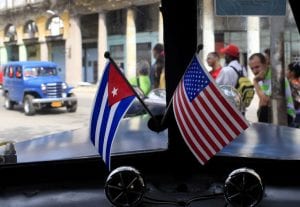In early October, the US Patent and Trademark Office (USPTO) met with the Cuban Industrial Property Office (OCPI) in what is deemed as a “historic office-to-office meeting” by the USPTO during the World Intellectual Property Organization’s (WIPO) general assemblies in Geneva, Switzerland.[1] At this meeting, U.S. and Cuba shared common agreements to strengthen their IP systems for the 21st century.[2]
The USPTO acknowledged the importance of strong IP rights in enabling foreign direct investment and capital flows while helping to “inspire market confidence in terms of the commercial enforceability of IP.”[3] As a consequence, the USPTO considered its engagement with their Cuban counterparts during such meetings as paramount in developing a “long term strategy to protect IP in the region,” said Russ Slifer, Deputy Under Secretary of Commerce for Intellectual Property and Deputy Director of the USPTO.[4]
The October meeting illustrates continuing interests of both U.S. and Cuba in exploring their IP systems. A month earlier in September, the UPSTO mission traveled to Havana for a regional WIPO seminar on the Patent Cooperation Treaty (PCT), which aimed to investigate ways in which the U.S. is permitting country to country filings.[5] Slifer and his staff met with Cuban officials and the OCPI to express U.S. interests and to reinforce both parties’ joint participation and collaboration in their IP systems.[6]
Further, in May 2016, USPTO staff traveled to Cuba to participate in a series of events organized by WIPO and the OCPI to begin a dialogue to strengthen the relations between the two offices.[7] For the first time in over fifty years, UPSTO officials were able to meet face-to-face with OCPI officials.[8] The UPSTO explained its patent and trademark operations and background, and expressed interest in establishing a solid foundation for future collaboration.[9]
From this series of meetings, the USPTO championed “IP both domestically and abroad, as businesses in a global economy need the security of knowing that their innovative technology, brands, creative works and even trade secrets, are secure in foreign markets.”[10]
Moreover, Slifer observed that these meetings are simply the beginning to build upon the actions of U.S Secretary of Commerce Penny Pritzker and President Obama.[11] In December 2014, President Obama had called for the re-establishment of U.S. diplomatic relations with Cuba.[12] In October 2015, Secretary Pritzker traveled to Cuba to further reinforce ties between the two parties by jointly launching the U.S.-Cuba Regulatory Dialogue with the Cuban Minister of Foreign Trade and Foreign Investment, Rodrigo Malmierca, which enables “both countries to discuss the impact of U.S. policies toward Cuba, and for U.S. officials to learn more about the structure and status of the Cuban economy.”[13]

